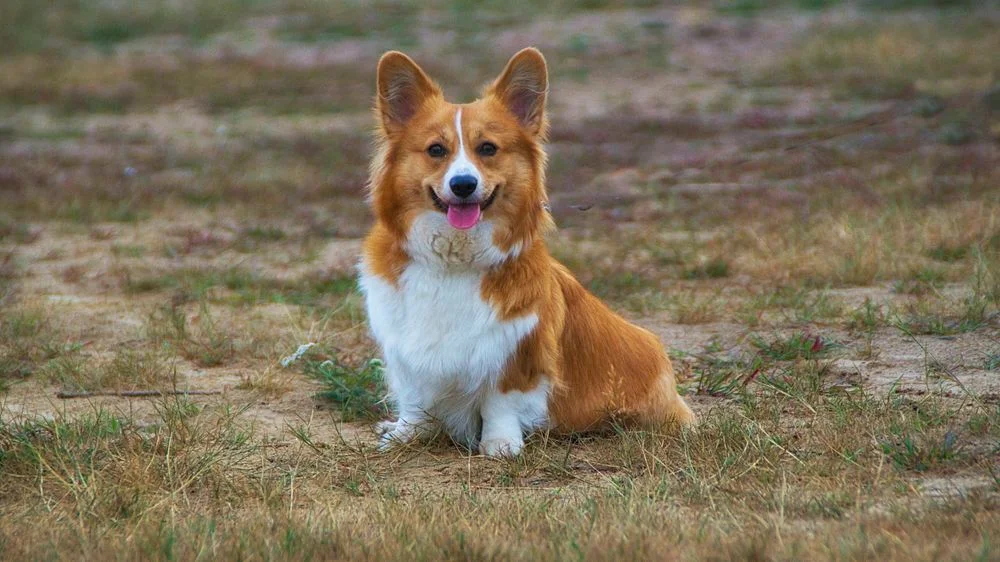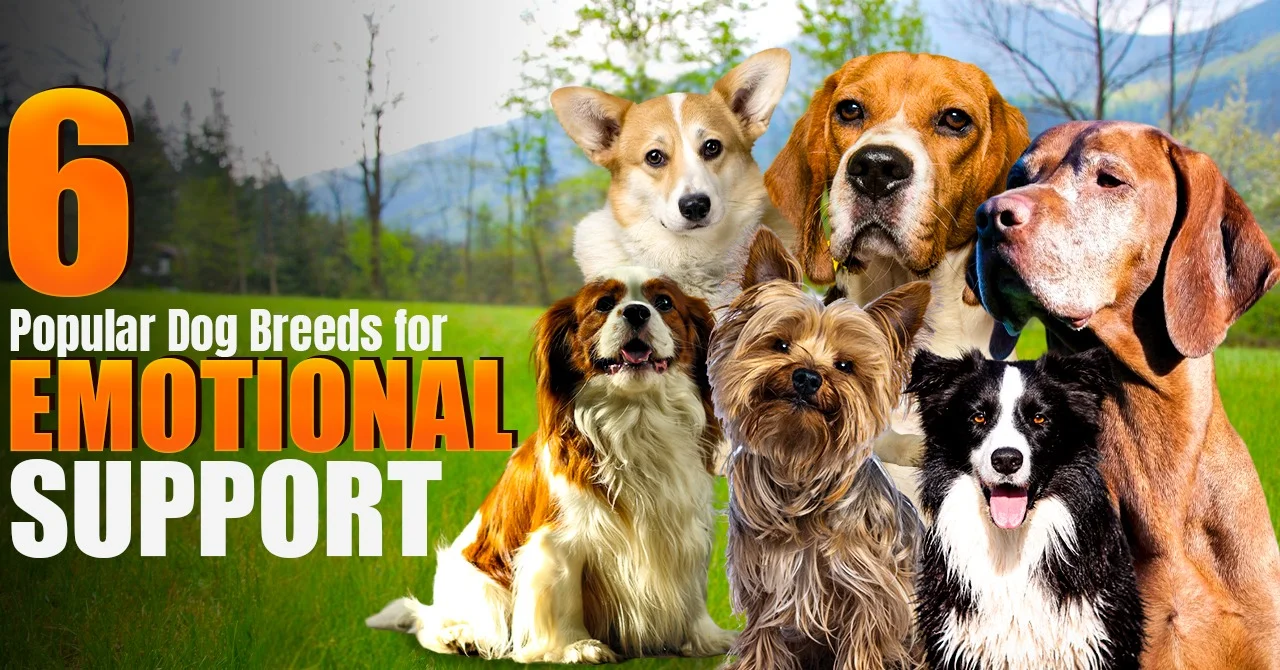Those four-legged dogs possess an extraordinary knack for providing more than just companionship. They offer a sanctuary of unconditional love and emotional support. Emotional support dogs have become very popular lately. They help people feel better when they’re stressed or anxious. This exploration will look at different dog breeds that can give support. It will give helpful information for people who want a dog for emotional support.
Choosing the Best Emotional Support Dog Breed: Navigating the Maze
Choosing the right emotional support dog is a big decision. Consider things like size, temperament, and energy levels. These factors help find the best match for someone’s emotional needs.
Cavalier King Charles Spaniel: The Regal Comforter Revisited

- Overview:
They are a small breed with a regal charm is not just a pet but a devoted emotional support companion.
- Temperament:
Cavaliers are known for being affectionate, friendly, and adaptable. They understand and respond to their owner’s emotions well.
- Why Ideal for Emotional Support:
Cavaliers possess an innate ability to form deep emotional connections. Their loyalty and comforting presence make them a top choice for emotional support.
- Affectionate Companions:
Cavaliers are more than just pets. They also act as therapists, providing comfort through gentle actions and understanding.
- Adaptability:
These dogs easily adjust to different lifestyles, so they’re great for active people or those who like quiet moments at home.
- Regal Presence:
Cavaliers have an elegant appearance and graceful demeanor, which adds a touch of royalty to the emotional support they offer.
- Beyond Companionship:
Cavaliers offer more than companionship; their calming effect and unique form of comfiness make them a source of solace.
- Silent Understanding:
Owners often speak of a deep, unspoken connection with their Cavaliers, creating a bond that goes beyond words.
- Unconditional Support:
Cavaliers offer unconditional support in every paw step, standing by their owners through the highs and lows of life.
Corgi: Beyond Royalty’s Companions

- Overview:
Corgis are the queen’s favorite breed and great emotional support dog.
- Notable Characteristics:
Intelligent and playful, Corgis form robust bonds with their owners, displaying a keen sense of emotional shifts.
- How Corgis Provide Emotional Support:
Corgis are not only playful but also contribute to a joyful atmosphere. They promote emotional well-being with their loyalty and engaging nature.
- Royal Roots:
Corgis have royal connections but are also down-to-earth and relatable companions that people love.
- Compact Joy Dispensers:
Corgis have expressive eyes and a friendly demeanor. They are small but bring immense joy and comfort to their owners.
- Playful Nature:
Corgis are full of playful energy. They create a lively environment and lift spirits. They also provide constant emotional support.
- Loyalty in Every Wiggle:
Corgis show loyalty by wagging their tails, proving their dedication to their owners’ happiness.
Yorkshire Terrier: The Tiny Titans Unleashed

They may be small, but they are emotional solid support companions. They have bold and confident personalities.
- Small Size, Big Comfort:
These small creatures offer comfort just by being there and being loving. They are great at emotional support.
- Personalities Suited for Emotional Support:
Yorkshire Terriers are tiny and comforting, ideal for those who desire a small, affectionate friend.
- Confidence in Every Stride:
Yorkshire Terriers may be small, but their confidence is boundless. Their bold demeanor contributes to a reassuring and empowering presence.
- Unleashing Affection:
Yorkshire Terriers may be small, but they shower their owners with love and form strong bonds.
- Adaptable to Various Lifestyles:
Yorkshire Terriers can adjust well to busy cities or peaceful countryside living. They are versatile companions.
- The Power of Presence:
Yorkshire Terriers have a special power. They make you feel safe and calm, even though they are small.
- A Big Heart in a Small Package:
A small Yorkshire Terrier has a big heart that provides unwavering emotional support to others.
Vizsla Dog: Energetic Souls Entwined

- Understanding Vizslas:
Vizslas are known for their striking appearance. They have sleek, rust-colored coats. Their lively disposition also sets them apart as energetic and vibrant companions.
- Energetic Companionship:
Vizslas bring lots of energy to their owners’ lives. They form a strong bond by being lively and enthusiastic.
- Vizslas as Emotional Support Animals:
Vizslas are strong and can understand and help their owners with their emotions. They offer constant support.
- A Symphony of Motion:
Vizslas are active dogs and make owners’ lives more active, bringing joy and improving emotional well-being.
- Loyal Partners in Activity:
Vizslas are loyal partners in every activity. They enhance the emotional connection during walks and play.
- Expressive Affection:
Vizslas show their love for their owners by wagging their tail and leaping around.
- Joyful Presence:
Vizslas bring joy and are energetic companions, always providing happiness and emotional fulfillment.
Collie: A Legacy Beyond Lassie’s Shadow

- Collies: More than Lassie
Collies are gentle and smart animals with a lasting legacy, even beyond Lassie’s fame.
- Gentle Demeanor
Collies are gentle and caring, making them great emotional support animals for families who want comfort.
- Why Collies Make Great Emotional Support Partners
Their caring and loyal nature creates a strong emotional bond, providing comfort during tough times. Collies go beyond expectations to create meaningful bonds.
- Loyal Guardians
Collies have the instinct to protect and care for their owners. They become loyal guardians, which helps their owners feel secure and trusted emotionally.
- Intelligent Companions
Collies are smart and deeply connect with their owners, understanding their emotions beyond being pets.
- Creating Harmony
Collies make homes peaceful and calm, which helps everyone in the family feel emotionally stable.
- Gentle Support in Every Wag
Collie’s tail wags gently to show support, proving feelings can be expressed without words.
Beagle: Compact Joy Dispensers

A blade is a tiny friend that gives emotional support with its loving personality and expressive eyes.
- Playful Nature and Loyalty
Beagles are playful and loyal, creating joy and promoting emotional well-being with their affectionate nature.
- Beagles as a Source of Emotional Comfort
They are affectionate and give emotional comfort, helping owners through the ups and downs of life with their furry companions.
- Unconditional Love in a Small Package
Beagles may be compact, but their capacity for love is boundless. Their presence alone brings a sense of joy and comfort that goes beyond their size.
- Eager Companions in Every Adventure
Beagles are always ready for adventure. They bring excitement and joy, creating a strong emotional bond with their owners.
- Lively Tail Wags and Heartfelt Moments
Beagles wag their tails to show joy and strengthen the bond with their owners.
- The Little Package of Big Happiness
Beagles become little packages of big happiness in their small stature, spreading joy and love in every corner of their owner’s life.
Benefits of Emotional Support Dog for People
Emotional support dogs have many benefits. They offer companionship and improve mental and emotional well-being. Here are some key advantages of having emotional support animals:
Companionship and Unconditional Love:
Emotional support animals offer unwavering companionship and unconditional love. Their presence provides support, a source of comfort, and a constant, non-judgmental companion.
Stress Reduction:
Interacting with an emotional support dog has a calming effect on the human nervous system. When you pet a dog, it releases oxytocin. Oxytocin reduces stress and promotes relaxation.
Anxiety Management:
People with anxiety often feel comforted by having an emotional support dog around. These dogs are trained to sense anxiety and depression and offer comfort to ease distress.
Emotional Support:
Emotional support animals are attuned to their owner’s emotions. Dogs can tell when their owner is sad and comfort them in their own special way.
Mood Enhancement:
Emotional support animals’ playful and affectionate nature positively impacts mood. The joy and happiness they bring through their actions contribute to an overall sense of well-being.
Routine and Structure:
Caring for a dog introduces a sense of performance and structure into daily life. A regular and predictable schedule can benefit people with mental health challenges.
Increased Physical Activity:
Exercise is important for mental health. Emotional support helps motivate physical activity. Daily walks and playtime provide not just exercise for the dog but also for the owner.
Sense of Purpose:
Owning an emotional support dog imparts a sense of purpose and responsibility. Daily feeding, grooming, and caring for the dog contribute to a feeling of accomplishment and meaning.
Social Interaction:
Emotional support dogs can serve as social facilitators. Walking a dog or going to dog-friendly places helps people connect with others, reducing loneliness.
Reduced Feelings of Loneliness:
Loneliness can significantly impact mental health. Emotional support animals keep you company and help you feel less lonely. They foster a sense of interpersonal connection.
Non-Judgmental Presence:
Dogs are naturally accepting. They provide a safe place for people to be themselves without worry. This non-judgmental presence can be exceptionally comforting during difficult times.
Enhanced Coping Mechanisms:
Having an emotional support dog helps people deal with stress and tough times better. The connection with the dog helps us handle life’s challenges and gives us support.
In conclusion, emotional support dogs offer more than just companionship. These dogs play a crucial role in their owners’ lives by providing emotional, psychological, and physical support.
Training Your Emotional Support Animal: A Bond-Enhancing Journey
All dogs provide emotional support, but training is essential for them. The training helps the owner and their furry companion form a close and emotional bond. You can have a well-behaved and responsive pet with general tips and specific training.
Additional Best Dog Breeds for Emotional Support: Expanding the Horizon Further
Let’s keep exploring emotional support dog breeds. Here are five more breeds known for providing great emotional support.
Golden Retriever: The Golden Comforter Extended
Friendly and Gentle:
Golden Retrievers are friendly and gentle, which makes them great emotional support companions.
Intelligent and Easy to Train:
Emotional support animals are effective because they are smart and trainable. They respond well to their owners.
Labrador Retriever: Versatility Defined
Versatile and Affectionate:
Labradors are popular service dogs, and they are also great at providing emotional support. Their affectionate nature positions them as comforting companions dog.
Adaptable to Various Environments:
Labradors are well-known for being adaptable. They are a good fit for people with different lifestyles and living situations.
Poodle: Allergen-Friendly Support
Hypoallergenic Option: Poodles are one of the most popular emotional support breed of dog. Poodles, available in various sizes, are an excellent choice for individuals with allergies. Their hypoallergenic coat minimizes the risk of allergic reactions.
Intuitive Companions:
Poodles are admired because they can sense and respond to their owner’s emotions. They can often sense and respond to their owner’s emotions.
Shih Tzu: Big Hearts in Small Packages Extended
Loyal and Affectionate: Shih Tzus boast big hearts despite their diminutive size. Their loyalty and affectionate nature render them wonderful companions for emotional support.
Low Maintenance:
Shih Tzus are easy to care for because they are small and have low-maintenance coats. They are a great choice for people who want an emotional support pet that doesn’t require a lot of effort.
Dachshund: Courage in Compact Form Extended
Compact and Loving:
Dachshunds offer a special charm with their unique long bodies and short legs. Their loving nature and small size make them suitable for emotional support.
Courageous and Protective:
Dachshunds may be small, but they are brave and protective, making their owners feel safe.
Conclusion: Crafting a Lifelong Tapestry of Comfort
In summary, choosing an emotional support dog is a major decision that has a significant impact on mental and emotional well-being. The list of breeds has expanded. It now includes Golden Retrievers, Labrador Retrievers, Poodles, Shih Tzus, and Dachshunds. These breeds offer many options for people looking for an emotional support companion. Dogs create a special bond that goes beyond words and gives comfort and support.
FAQs: Unveiling Answers to Your Queries
Can emotional support dogs be trained to perform specific tasks?
Emotional support dogs aren’t trained for specific tasks like service dogs. But they can still be trained to offer comfort and support in different situations.
What are the benefits of having multiple emotional support dogs?
Having more than one emotional support dog can bring extra companionship and support. This is especially true in bigger families, and it can create a feeling of safety and happiness.
How do you deal with people afraid of dogs in public spaces?
It’s crucial to be respectful of others’ fears. Teach them about emotional support dogs and make sure your dog behaves in public to ease worries.
Can any dog become an emotional support dog with the proper training?
All dogs can provide emotional support, but certain breeds are naturally better at it. Training is important for dogs to be good emotional support companions and to form strong bonds.
Are specific toys or activities enhancing your dog’s emotional bond?
Playing together, training, and giving toys can strengthen the bond with your support dog.




